Find Help
More Items From Ergsy search
-
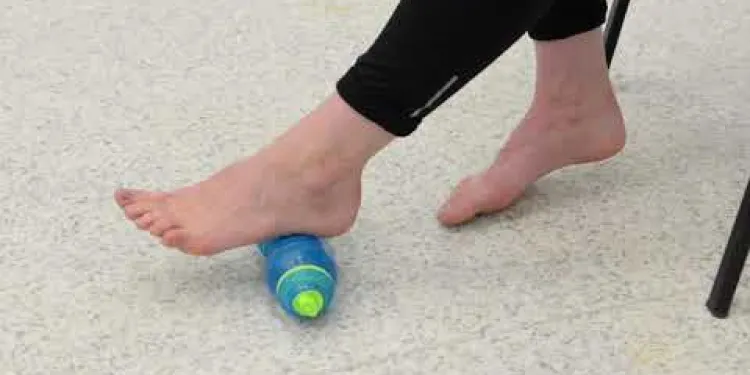
Plantar Fascia Cold Therapy
Relevance: 100%
-
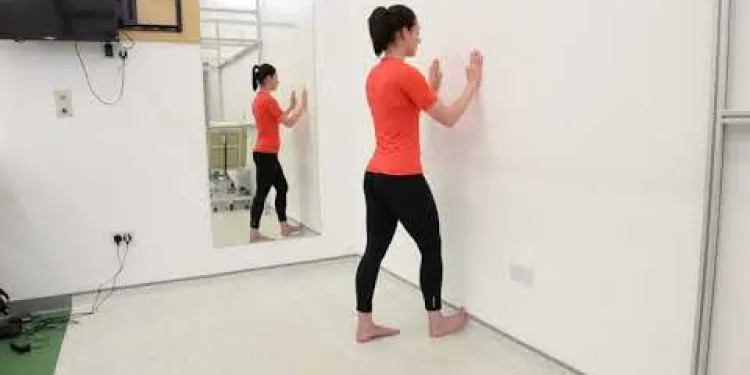
Plantar Fascia Wall Stretch
Relevance: 64%
-
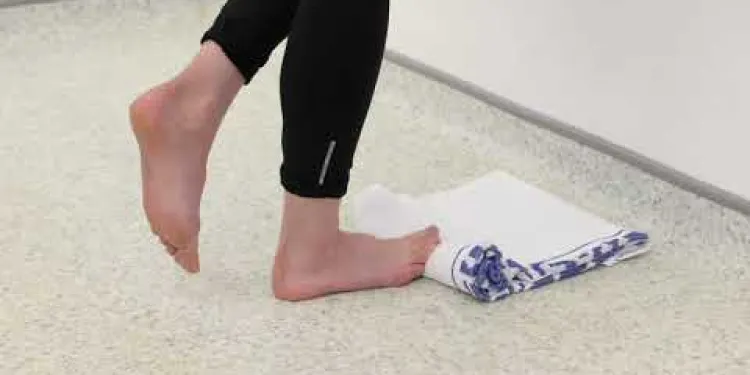
Plantar Fascia Loading Exercise (High Load Exercise)
Relevance: 59%
-

Plantar Fascia Intrinsic Theraband Strengthening Exercise
Relevance: 58%
-

Plantar fasciitis
Relevance: 48%
-

Plantar fasciitis
Relevance: 47%
-

Can cold weather cause a cold?
Relevance: 24%
-
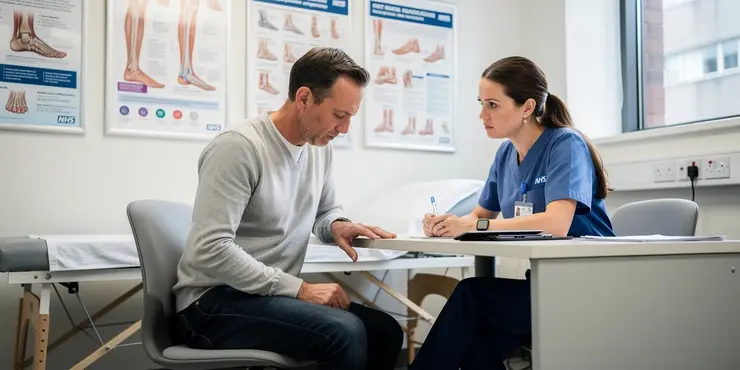
Heel pain | NHS
Relevance: 23%
-
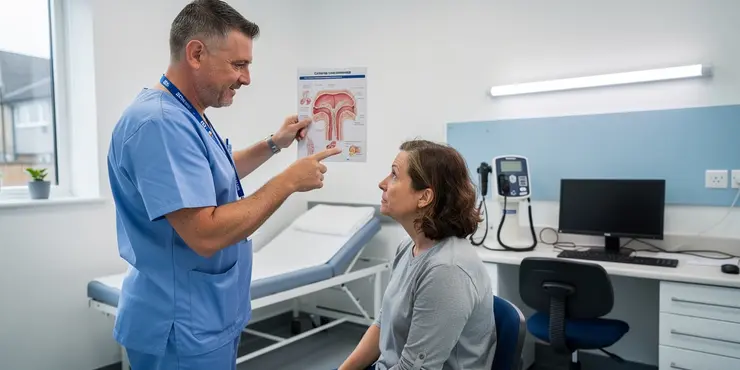
What are Cold Sores?
Relevance: 22%
-

Is there a cure for cold sores?
Relevance: 21%
-

Are cold sores contagious?
Relevance: 21%
-

What causes cold sores?
Relevance: 21%
-

What are the symptoms of a cold sore?
Relevance: 21%
-

What are the common symptoms of a cold?
Relevance: 21%
-

Is there a way to cure a cold quickly?
Relevance: 21%
-

Should I see a doctor for a cold?
Relevance: 21%
-

Is it safe to exercise with a cold?
Relevance: 21%
-

How to treat a cold | NHS
Relevance: 20%
-

How are cold sores transmitted?
Relevance: 20%
-

Can I take antibiotics for a cold?
Relevance: 20%
-

How to Treat a Common Cold
Relevance: 20%
-

when will cold sores go away?
Relevance: 20%
-

What triggers a cold sore outbreak?
Relevance: 20%
-

Is Vitamin C effective against colds?
Relevance: 20%
-

How can I prevent cold sores?
Relevance: 20%
-

Is it safe to take cold showers during a heatwave?
Relevance: 19%
-
Can orange juice help prevent colds?
Relevance: 19%
-

How can I treat a cold at home?
Relevance: 19%
-

What is radiation therapy?
Relevance: 18%
-

Can I use a humidifier to help with my cold symptoms?
Relevance: 18%
-

How long does a common cold typically take to go?
Relevance: 18%
-

Can children take the same cold medications as adults?
Relevance: 18%
-

Is it okay to use ice packs or cold showers to cool down?
Relevance: 18%
-

Can I receive the Warm Home Discount and Cold Weather Payment?
Relevance: 17%
-

Hormone Therapy for prostate cancer
Relevance: 17%
-

Honey 'as good as antiviral creams' for cold sores | NHS Behind the Headlines
Relevance: 17%
-

What should you do if you have a cough or cold?
Relevance: 17%
-

What is ketamine infusion therapy?
Relevance: 17%
-

Adam's story on stammering - Therapy
Relevance: 17%
-

How can I prevent spreading my cold to others?
Relevance: 17%
Plantar Fascia Cold Therapy: A Comprehensive Guide
What is Plantar Fascia?
The plantar fascia is a thick band of tissue that runs along the bottom of your foot, connecting your heel bone to your toes. It plays a critical role in foot mechanics by supporting the arch and absorbing shock. Problems with the plantar fascia, most notably plantar fasciitis, can lead to significant pain and discomfort, especially in the mornings or after prolonged periods of standing.Understanding Plantar Fasciitis
Plantar fasciitis is one of the most common causes of heel pain. It occurs when the plantar fascia becomes inflamed due to overstretching, overuse, or improper footwear. Individuals may experience a stabbing pain in the heel, which can worsen with activity. Although it can affect anyone, it is most prevalent in runners, overweight individuals, and those who frequently wear unsupportive shoes.The Role of Cold Therapy
Cold therapy, or cryotherapy, is an effective treatment for managing the pain and inflammation associated with plantar fasciitis. Applying cold packs or ice wrapped in a cloth to the affected area can reduce blood flow, numb nerve endings, and decrease swelling. This can provide immediate relief and facilitate the healing process.How to Apply Cold Therapy
In the UK, you can find a variety of cold therapy products like cold packs, gel packs, and specialised cold therapy socks. For optimal results, follow these steps: 1. Wrap a cold pack or a bag of frozen peas in a thin towel to prevent frostbite. 2. Apply it to the painful area of your foot for 15-20 minutes. 3. Remove the cold pack and allow the skin to return to normal temperature before reapplying, if necessary. 4. Repeat the process 3-4 times a day, especially after activities that strain your foot.Precautions and When to Seek Medical Advice
While cold therapy can be highly effective, it's essential to follow some precautions: - Never apply ice directly to the skin as it can cause frostbite. - Avoid prolonged exposure (more than 20 minutes) to prevent skin damage. - If you have circulatory problems or diabetes, consult with a healthcare provider before using cold therapy. If pain persists despite treatment, or if you experience signs of a more serious condition (such as severe swelling, bruising, or an inability to bear weight on the affected foot), seek medical advice promptly.Conclusion
Cold therapy offers a simple and accessible way to manage the symptoms of plantar fasciitis. By reducing pain and inflammation, it allows you to continue with daily activities while supporting the healing process. For residents in the UK, a wide range of cold therapy products are available, making it easy to find a solution that fits your needs. Always remember to follow the recommended guidelines for safe and effective treatment.Plantar Fascia Cold Therapy: A Complete Guide
What is Plantar Fascia?
The plantar fascia is a strong band of tissue. It runs along the bottom of your foot. It connects your heel to your toes. The plantar fascia helps support the arch of your foot and takes in shock when you walk. Sometimes, the plantar fascia can hurt. This is called plantar fasciitis. It can make your heel and foot hurt, especially in the morning or after standing for a long time.Understanding Plantar Fasciitis
Plantar fasciitis makes your heel hurt a lot. It happens when the plantar fascia gets swollen. This can be from stretching too much, using your foot too much, or wearing bad shoes. It feels like a sharp pain in your heel. It can get worse when you move. People who run a lot, are overweight, or wear shoes without support often get plantar fasciitis.The Role of Cold Therapy
Cold therapy helps with the pain and swelling from plantar fasciitis. Putting something cold, like a cold pack or ice wrapped in cloth, on your foot can help. It can make the area numb, and the swelling go down. This makes the pain less and helps you get better.How to Apply Cold Therapy
In the UK, you can find many cold therapy products, like cold packs and gel packs. Here’s how to use them: 1. Wrap a cold pack or frozen peas in a thin towel. This stops your skin from getting hurt. 2. Put it on the hurting part of your foot for 15-20 minutes. 3. Take it off and let your skin warm up before putting it on again. 4. Do this 3-4 times a day, especially after using your foot a lot.Precautions and When to Seek Medical Advice
Be careful with cold therapy: - Do not put ice straight on your skin. It can hurt you. - Do not leave it on for more than 20 minutes. This can damage your skin. - If you have blood flow problems or diabetes, talk to a doctor first. See a doctor if the pain does not go away, or if you have serious swelling, bruising, or cannot stand on your foot.Conclusion
Cold therapy is a simple way to help with plantar fasciitis pain. It lets you keep doing things you like and helps your foot heal. In the UK, there are many cold therapy products to choose from. Make sure to follow the guidelines to stay safe and get the best results.Frequently Asked Questions
What is plantar fascia cold therapy?
Plantar fascia cold therapy involves applying cold treatments to the plantar fascia, which is a thick band of tissue that runs across the bottom of your foot. This therapy helps reduce inflammation and relieve pain.
How does cold therapy help with plantar fasciitis?
Cold therapy helps by numbing the affected area, reducing inflammation, and decreasing blood flow to the injured tissue which alleviates pain and muscle spasms.
How often should I apply cold therapy to my plantar fascia?
It is generally recommended to apply cold therapy to your plantar fascia for 15-20 minutes, 3-4 times a day. Always follow medical advice specific to your situation.
What are some common types of cold therapy products for plantar fascia?
Common cold therapy products for plantar fascia include ice packs, gel packs, frozen water bottles, and specially designed cold wraps.
Is it safe to apply ice directly to the skin?
No, it is not recommended to apply ice directly to the skin as it can cause frostbite. Always wrap the ice pack in a cloth or towel before applying it.
Can I use a frozen water bottle for cold therapy on my plantar fascia?
Yes, rolling a frozen water bottle under your foot can effectively provide cold therapy and help massage the plantar fascia at the same time.
What should I do if I experience increased pain during cold therapy?
If you experience increased pain during cold therapy, you should stop immediately and consult with a healthcare professional for further advice.
Can cold therapy be combined with other treatments for plantar fasciitis?
Yes, cold therapy can be combined with other treatments such as stretching exercises, orthotics, anti-inflammatory medications, and physical therapy. Always consult your healthcare provider for a comprehensive treatment plan.
How long does it take to see improvement with cold therapy for plantar fasciitis?
The relief provided by cold therapy can be immediate, but long-term improvement may take several weeks of consistent treatment, depending on the severity of the condition.
Can cold therapy cure plantar fasciitis?
Cold therapy can help manage pain and reduce inflammation, but it is typically part of a larger treatment plan rather than a standalone cure for plantar fasciitis.
Are there any side effects of using cold therapy for plantar fasciitis?
Side effects are generally minimal but may include skin irritation, frostbite, and temporary discomfort. It is important to follow guidelines to avoid these issues.
Is cold therapy suitable for everyone with plantar fasciitis?
Cold therapy is generally suitable for most people, but those with certain conditions like Raynaud's disease or poor circulation should consult a healthcare professional before use.
Should I continue cold therapy if my symptoms improve?
It's advisable to continue cold therapy for a short period even after symptoms improve to ensure the inflammation is fully reduced. Consult your healthcare provider for specific guidance.
Can I walk immediately after applying cold therapy?
It’s best to allow your foot to return to normal temperature before walking to ensure proper blood circulation and prevent further injury.
Where can I purchase cold therapy products for plantar fasciitis in the UK?
Cold therapy products for plantar fasciitis can be purchased at local pharmacies, sports stores, and online retailers in the UK.
What is Plantar Fascia Cold Therapy?
Plantar fascia cold therapy is a way to help your feet feel better.
If your foot hurts, you can use something cold, like an ice pack. Put it on your foot to help make the pain go away.
This can help if you have a sore or tired foot.
To do it safely, wrap the ice pack in a towel before putting it on your skin. Leave it on your foot for about 15 minutes. Do this a few times a day.
If you need help, a grown-up can show you how to do it.
Plantar fascia cold therapy means putting something cold on the bottom of your foot. The plantar fascia is a strong band that goes across your foot. Using cold helps to make swelling go down and stop it from hurting.
How can cold therapy help with foot pain?
Cold therapy means using something cold, like ice, to help your body feel better.
It can help with foot pain from a problem called plantar fasciitis. This is when the bottom of your foot hurts.
Putting something cold on your foot can make the pain feel better.
It helps by stopping the sore feeling and making any swelling go down.
Here are some tools you can use:
- An ice pack
- A bag of frozen peas wrapped in a towel
Try to do this for about 15-20 minutes a few times each day.
If the pain doesn’t get better, talk to a doctor or a nurse.
Cold therapy can help when you hurt yourself. It makes the hurt area feel numb, which means you don't feel as much pain. It also helps stop swelling and makes the blood flow less to the hurt spot. This can help with pain and muscle cramps.
How often should I use cold therapy on my foot?
Put something cold on your foot where it hurts for 15-20 minutes. Do this 3-4 times every day. Always listen to what your doctor tells you to do.
What are some common types of cold therapy products for plantar fascia?
Here are some cold products that help sore feet:
- Ice Packs: These are cold gel packs you can use on your feet.
- Cold Wraps: These wraps go around your foot to cool it down.
- Frozen Water Bottles: Roll your foot over a frozen bottle for relief.
- Cold Foot Baths: Soak your feet in a tub with cold water and ice.
Tips to help you use cold products:
- Use a timer: Keep it cold on your foot for 15-20 minutes.
- Don't put ice directly on skin: Use a cloth or towel.
- Rest while using cold therapy.
When your foot hurts from a problem called plantar fascia, you can use cold things to help.
Some things you can try are ice packs, gel packs, frozen water bottles, or special cold wraps. These can make your foot feel better.
Can I put ice right on my skin?
It's not safe to put ice straight on your skin. Ice can hurt your skin.
You should wrap the ice in a cloth or towel first. This will protect your skin.
You can ask a grown-up for help if you are not sure. You can also use a timer to make sure you don't use the ice for too long.
No, do not put ice straight on your skin. It can hurt your skin. Always wrap the ice in a cloth or towel first.
Can I Use a Frozen Water Bottle for Foot Pain?
You have foot pain. This might be in a part called the plantar fascia. You want to know if a frozen water bottle can help.
Yes, you can use a frozen water bottle.
It can help your foot feel better. Roll it under your foot. Do this slowly. Try for about 15 minutes.
If you want, you can use timers to keep track of time. You can also play calming music.
Yes, you can use a frozen water bottle to help your foot. It makes your foot feel cold, which can help with pain. Rolling it under your foot is like giving your foot a gentle massage. This can be good for your feet.
What should I do if cold therapy makes my pain worse?
If using cold therapy hurts more, stop right away.
Tell a grown-up or someone who helps you feel better.
Try wrapping the ice pack in a towel so it isn’t too cold.
Only use cold therapy for a little while, like 10 to 15 minutes.
Think about using other ways to feel better, like:
- Warm packs
- Gentle stretching
- Relaxing exercises
If your pain gets worse, talk to a doctor.
If you feel more pain when using cold therapy, stop right away. Talk to a doctor or nurse for help.
Can you use cold treatment with other help for heel pain?
Yes, you can use cold therapy with other treatments. These include stretching exercises, special shoe inserts, medicines to help with swelling, and working with a physical therapist. Always talk to your doctor to make a plan that works best for you.
How long until my foot feels better with cold therapy?
When you use cold therapy for your foot, it usually takes a few days to start feeling better. You might need to do it a few times each day.
If your foot still hurts after a week or two, you should talk to a doctor.
To help you, you can use:
- An ice pack or a bag of frozen peas.
- A towel to protect your skin from getting too cold.
- Ask someone for help if you need it.
Cold treatment can help you feel better right away. But to feel much better for a long time, you might need to keep using it for several weeks. This depends on how bad your problem is.
Can using ice help fix foot pain?
Does putting ice on your foot help it feel better? Let's find out!
If your foot hurts when you walk, it could be plantar fasciitis. This means your foot's bottom is sore.
You can try putting ice on your foot. It might help the pain go away for a while.
If your foot still hurts, talk to a doctor. They can give you more help.
Here are some tools to help: - Use an ice pack or a bag of frozen peas. - Rest your foot when it hurts.
Cold therapy can help you feel less pain and help with swelling. But, it is usually just one part of a bigger plan to treat plantar fasciitis. It is not a cure by itself.
Can using cold therapy for sore feet cause problems?
Using this might make your skin sore, cold, or a bit uncomfortable. To stop this from happening, make sure you follow the rules and instructions.
Can everyone use cold therapy for foot pain?
Cold therapy is usually safe for most people. But if someone has certain health problems, like Raynaud's disease or bad blood flow, they should talk to a doctor before trying it.
Can I keep doing cold therapy if I start to feel better?
It is good to keep using ice packs for a little while, even if you feel better. Ice can help make sure the swelling goes away. Talk to your doctor to find out what is best for you.
Can I walk right away after using something cold?
When you use something cold on your body, it's called cold therapy. Sometimes, this helps with pain or swelling.
Ask a grown-up or a doctor if you can walk after using cold therapy. They might say it's okay, or they might say to wait a little bit.
To help understand better, you can try:
- Asking someone to explain it with easy words.
- Looking at pictures that show how to use cold therapy.
- Using apps or websites that help with reading and understanding.
Before you start walking, wait for your foot to feel normal and warm again. This helps your blood move well and stops more hurting.
Where can I buy cold packs for foot pain in the UK?
If your feet hurt, you can use cold packs to help.
Here is how you can find them:
- Look in drugstores or pharmacies.
- Visit big shops like Boots or Superdrug.
- Search online stores like Amazon or eBay.
If you need help, ask a friend or family member to help you shop.
You can buy cold packs for sore feet at local pharmacies, sports shops, and online stores in the UK.
Useful Links
This website offers general information and is not a substitute for professional advice.
Always seek guidance from qualified professionals.
If you have any medical concerns or need urgent help, contact a healthcare professional or emergency services immediately.
Some of this content was generated with AI assistance. We’ve done our best to keep it accurate, helpful, and human-friendly.
- Ergsy carfully checks the information in the videos we provide here.
- Videos shown by Youtube after a video has completed, have NOT been reviewed by ERGSY.
- To view, click the arrow in centre of video.
- Most of the videos you find here will have subtitles and/or closed captions available.
- You may need to turn these on, and choose your preferred language.
- Go to the video you'd like to watch.
- If closed captions (CC) are available, settings will be visible on the bottom right of the video player.
- To turn on Captions, click settings .
- To turn off Captions, click settings again.
More Items From Ergsy search
-

Plantar Fascia Cold Therapy
Relevance: 100%
-

Plantar Fascia Wall Stretch
Relevance: 64%
-

Plantar Fascia Loading Exercise (High Load Exercise)
Relevance: 59%
-

Plantar Fascia Intrinsic Theraband Strengthening Exercise
Relevance: 58%
-

Plantar fasciitis
Relevance: 48%
-

Plantar fasciitis
Relevance: 47%
-

Can cold weather cause a cold?
Relevance: 24%
-

Heel pain | NHS
Relevance: 23%
-

What are Cold Sores?
Relevance: 22%
-

Is there a cure for cold sores?
Relevance: 21%
-

Are cold sores contagious?
Relevance: 21%
-

What causes cold sores?
Relevance: 21%
-

What are the symptoms of a cold sore?
Relevance: 21%
-

What are the common symptoms of a cold?
Relevance: 21%
-

Is there a way to cure a cold quickly?
Relevance: 21%
-

Should I see a doctor for a cold?
Relevance: 21%
-

Is it safe to exercise with a cold?
Relevance: 21%
-

How to treat a cold | NHS
Relevance: 20%
-

How are cold sores transmitted?
Relevance: 20%
-

Can I take antibiotics for a cold?
Relevance: 20%
-

How to Treat a Common Cold
Relevance: 20%
-

when will cold sores go away?
Relevance: 20%
-

What triggers a cold sore outbreak?
Relevance: 20%
-

Is Vitamin C effective against colds?
Relevance: 20%
-

How can I prevent cold sores?
Relevance: 20%
-

Is it safe to take cold showers during a heatwave?
Relevance: 19%
-
Can orange juice help prevent colds?
Relevance: 19%
-

How can I treat a cold at home?
Relevance: 19%
-

What is radiation therapy?
Relevance: 18%
-

Can I use a humidifier to help with my cold symptoms?
Relevance: 18%
-

How long does a common cold typically take to go?
Relevance: 18%
-

Can children take the same cold medications as adults?
Relevance: 18%
-

Is it okay to use ice packs or cold showers to cool down?
Relevance: 18%
-

Can I receive the Warm Home Discount and Cold Weather Payment?
Relevance: 17%
-

Hormone Therapy for prostate cancer
Relevance: 17%
-

Honey 'as good as antiviral creams' for cold sores | NHS Behind the Headlines
Relevance: 17%
-

What should you do if you have a cough or cold?
Relevance: 17%
-

What is ketamine infusion therapy?
Relevance: 17%
-

Adam's story on stammering - Therapy
Relevance: 17%
-

How can I prevent spreading my cold to others?
Relevance: 17%


